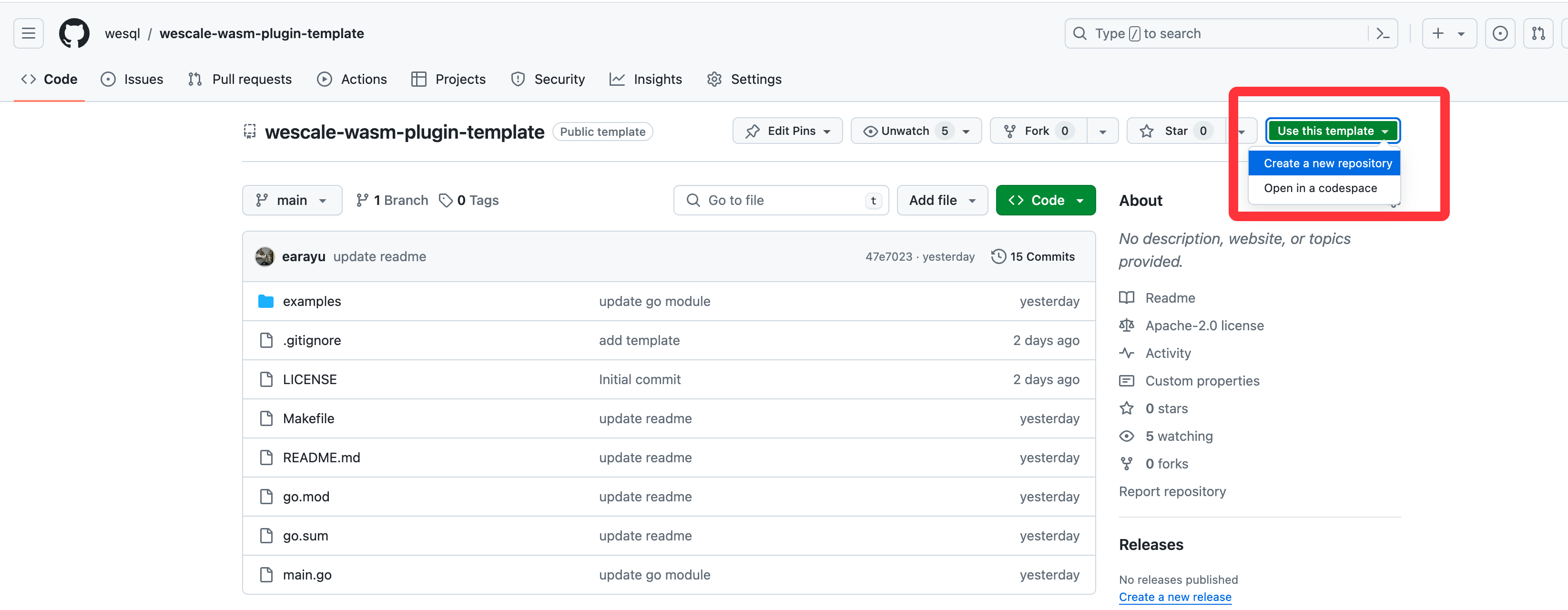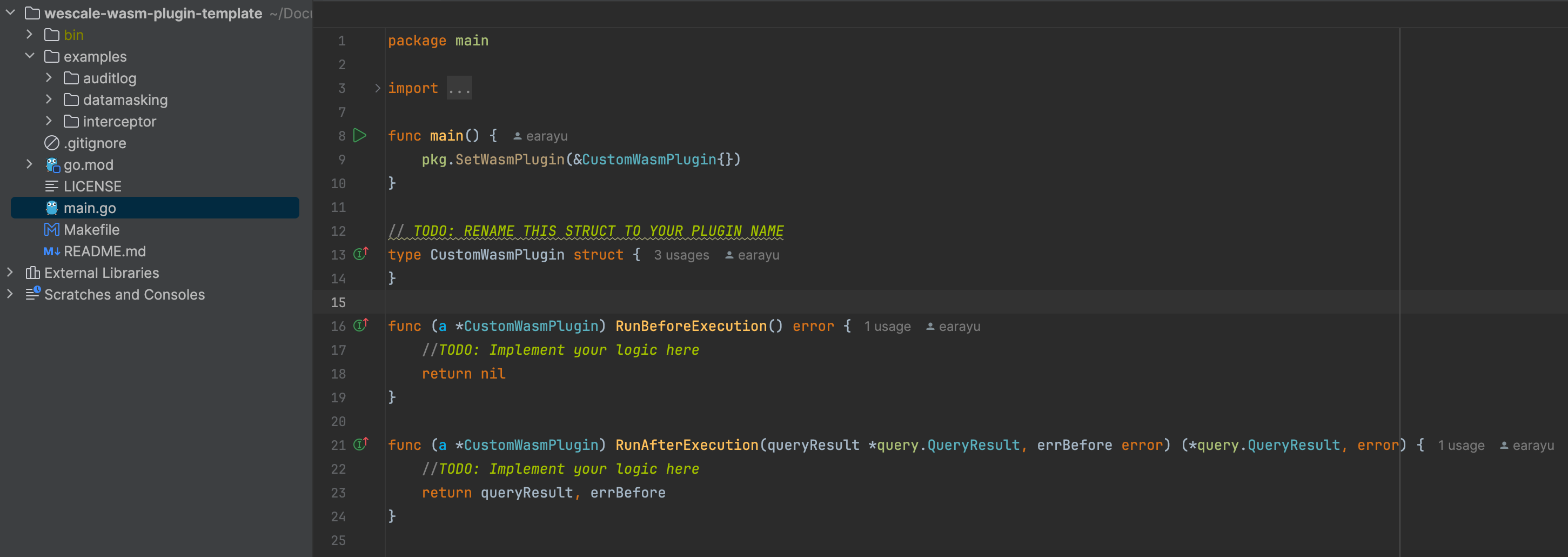Extending WeScale with Wasm Plugins
Overview
WeScale provides a new way to extend its functionality through WebAssembly (Wasm) plugins. While traditional methods like writing Filters allow users to customize behavior, they often require compiling and distributing code alongside the service provider's software, which can be cumbersome for many users.
Wasm plugins offer a more secure, dynamic, and user-friendly approach to extensibility. Similar to how modern browsers allow extensions or scripts to modify behavior, Wasm plugins let you inject custom logic into WeScale without deep integration complexities.
Prerequisites
- WeScale Access: Ensure you have access to a WeScale database instance.
- Familiar with Filters: Understanding of WeScale Filters is necessary.
Example Scenario Setup
We'll use a sample environment to demonstrate the creation and usage of filters. Consider the following database and table:
mysql> create database test_wasm;
mysql> use test_wasm;
mysql> create table test_wasm.t1 (c1 int primary key auto_increment, c2 int);
mysql> insert into test_wasm.t1 values (1, 1);
Step 1: Clone the WeScale Wasm Plugin Template
To simplify the process, we've prepared a template for you to write your Wasm Plugin. You can clone it from
WeScale-Wasm-Plugin-Template and follow the instructions
in the README.md to write your Wasm Plugin.
main.go: The main file where you'll write your plugin code.examples/: Contains example plugins for reference.Makefile: Helps with building and deploying the Wasm binary.README.md: Provides instructions on using the template.

Step 2: Write Your Plugin Code
Understanding the Plugin Code Structure
You will need to implement WasmPlugin interface by defining two functions: RunBeforeExecution and RunAfterExecution.
The RunBeforeExecution function is called before the SQL query is executed, while RunAfterExecution is called after the query is executed.
You can intercept or manipulate the SQL query in RunBeforeExecution and modify the query result in RunAfterExecution.
You also need to define a main function to start the plugin.

Implementing a Custom Wasm Plugin
DML queries without a WHERE clause can be dangerous as they can affect all rows in a table. It is a common security practice to prevent such queries from executing.
The output should return an error message if a WHERE clause is missing, like so:
mysql> DELETE FROM db.tbl;
Error from wasm plugin at before execution stage: no where clause
mysql> UPDATE db.tbl SET username = 'Bryce';
Error from wasm plugin at before execution stage: no where clause
Here's the complete code for the plugin
package main
import (
"fmt"
"github.com/wesql/sqlparser"
"github.com/wesql/sqlparser/go/vt/proto/query"
"github.com/wesql/wescale-wasm-plugin-sdk/pkg"
hostfunction "github.com/wesql/wescale-wasm-plugin-sdk/pkg/host_functions"
)
func main() {
pkg.InitWasmPlugin(&ParserWasmPlugin{})
}
type ParserWasmPlugin struct {
}
func (a *ParserWasmPlugin) RunBeforeExecution() error {
query, err := hostfunction.GetHostQuery()
if err != nil {
return err
}
stmt, err := sqlparser.Parse(query)
if err != nil {
hostfunction.InfoLog("parse error: " + err.Error())
return nil
}
switch stmt := stmt.(type) {
case *sqlparser.Update:
if stmt.Where == nil {
return fmt.Errorf("no where clause")
}
case *sqlparser.Delete:
if stmt.Where == nil {
return fmt.Errorf("no where clause")
}
default:
}
return nil
}
func (a *ParserWasmPlugin) RunAfterExecution(queryResult *query.QueryResult, errBefore error) (*query.QueryResult, error) {
// do nothing
return queryResult, errBefore
}
Let's break down the code of the plugin:
- Import Necessary Packages:
import (
"fmt"
"github.com/wesql/sqlparser"
"github.com/wesql/sqlparser/go/vt/proto/query"
"github.com/wesql/wescale-wasm-plugin-sdk/pkg"
hostfunction "github.com/wesql/wescale-wasm-plugin-sdk/pkg/host_functions"
)
Explain:
sqlparser: Library to parse SQL queries. It can be used to check for DML queries without aWHEREclause.wescale-wasm-plugin-sdk: SDK to interact with the WeScale host environment.host_functions: Functions provided by the host environment. e.g.hostfunction.GetHostQuery()returns the current executing SQL query.
- Implement
RunBeforeExecutionMethod:
This method intercepts the query before execution.
func (a *ParserWasmPlugin) RunBeforeExecution() error {
// Retrieve the SQL query using `hostfunction.GetHostQuery()`.
query, err := hostfunction.GetHostQuery()
if err != nil {
return err
}
// Parse the SQL query into an AST.
stmt, err := sqlparser.Parse(query)
if err != nil {
hostfunction.InfoLog("parse error: " + err.Error())
return nil
}
// Check for DML queries without a WHERE clause.
// Return an error if a `WHERE` clause is missing.
switch stmt := stmt.(type) {
case *sqlparser.Update:
if stmt.Where == nil {
return fmt.Errorf("no where clause")
}
case *sqlparser.Delete:
if stmt.Where == nil {
return fmt.Errorf("no where clause")
}
default:
}
return nil
}
- Implement
RunAfterExecutionMethod:
Since no action is needed after execution, you can leave it as is.
func (a *CustomWasmPlugin) RunAfterExecution(queryResult *query.QueryResult, errBefore error) (*query.QueryResult, error) {
return queryResult, errBefore
}
- Complete the Plugin:
Ensure your main.go includes the main function to register the plugin.
func main() {
pkg.InitWasmPlugin(&ParserWasmPlugin{})
}
Step 3: Compile and Deploy the Plugin
1. Build the Wasm Binary
Use the Makefile to compile your plugin into a Wasm binary:
make build-wasm-using-docker
This command generates the my_plugin.wasm file in the bin/ directory.
2. Deploy the Wasm Plugin to WeScale
First, install the wescale_wasm binary to help with deployment:
make install-wescale-wasm
Then, deploy your plugin using:
./bin/wescale_wasm --command=install \
--wasm_file=./bin/my_plugin.wasm \
--mysql_host=127.0.0.1 \
--mysql_port=15306 \
--mysql_user=root \
--mysql_password=root \
--create_filter
Replace the MySQL connection details with those of your WeScale instance.
3. Verify the Plugin Installation
Check if the plugin is active:
MySQL [mysql]> SHOW FILTERS\G
*************************** 1. row ***************************
id: 9
create_timestamp: 2024-09-29 10:23:15
update_timestamp: 2024-09-29 10:23:15
name: my_plugin_wasm_filter
description:
priority: 1000
status: ACTIVE
plans: ["Select","Insert","Update","Delete"]
fully_qualified_table_names: []
query_regex:
query_template:
request_ip_regex:
user_regex:
leading_comment_regex:
trailing_comment_regex:
bind_var_conds:
action: WASM_PLUGIN
action_args: wasm_binary_name="my_plugin.wasm"
Step 4: Test the Plugin
Example 1: Explain the Filter
Use the /*explain filter*/ comment to see which filters apply:
NOTICE: Make sure you are connecting to MySQL using
-cparameter, otherwise the/*explain filter*/comment will be ignored.
mysql -h127.0.0.1 -P15306 -Ac -e '/*explain filter*/ DELETE FROM test_wasm.t1;'
Expected output:
+-----------------------+-------------+----------+-------------+-----------------------------------+
| Name | description | priority | action | action_args |
+-----------------------+-------------+----------+-------------+-----------------------------------+
| my_plugin_wasm_filter | | 1000 | WASM_PLUGIN | wasm_binary_name="my_plugin.wasm" |
+-----------------------+-------------+----------+-------------+-----------------------------------+
Example 2: Attempt a DML Without WHERE Clause
Try running a DELETE without a WHERE clause:
mysql -h127.0.0.1 -P15306 -Ac -e 'DELETE FROM test_wasm.t1;'
Expected error:
ERROR 1105 (HY000) at line 1: target: .0.primary: vttablet: rpc error: code = Unknown desc = error from wasm plugin at after execution stage: error from wasm plugin at before execution stage: no where clause (CallerID: userData1)
The plugin intercepts and prevents the execution.
Step 5: Remove the Plugin
To uninstall the plugin:
./bin/wescale_wasm --command=uninstall --filter_name=my_plugin_wasm_filter
Confirm removal:
mysql -h127.0.0.1 -P15306 -e 'SHOW FILTERS\G'
The plugin should no longer be listed.
Conclusion
You've successfully created and deployed a Wasm plugin in WeScale that enhances security by preventing accidental execution of UPDATE or DELETE statements without a WHERE clause.
Wasm plugins provide a flexible and secure method to extend WeScale's functionality without the complexities of compiling and distributing code alongside the service provider's software.
Additional Resources
- WeScale Wasm Plugin Template: GitHub Repository
- Wasm Plugin Design Document: Design Document
Next Steps
- Explore More Examples: Check the
examples/directory for additional plugins. - Customize Further: Modify your plugin to handle other scenarios or add new features.
- Contribute: Share your plugins with the community or contribute to the template repository.
By leveraging Wasm plugins, you can tailor WeScale to better meet your application's specific needs, enhancing both functionality and security.